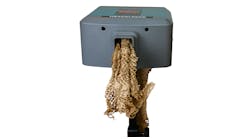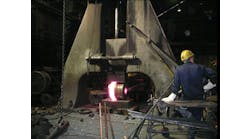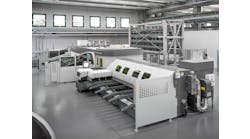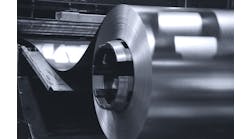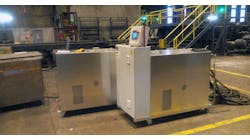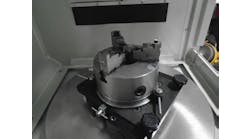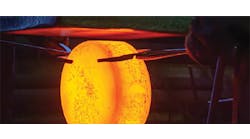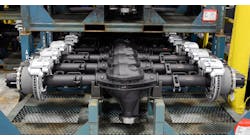“We’re extremely pleased that Ellwood has acquired Interstate,” said George Thomas, president of ISW. “Ellwood is a strong company in the business of making forgings and is dedicated to the business of operating companies for the long haul. I believe they will bring continued stability to the company for our employees, our customers and the community for many years.”
Ladish Co. Inc. purchased Chen-Tech Industries Inc., an Irvine, CA, forger of jet-engine components, in a merger valued at about $59 million. Ladish, a forger of jet-engine and aerospace components, is based in Cudahy WI.
The addition of Chen-Tech added capabilities of producing nickel-based and titanium components for smaller jet engines for single-aisle, regional and business aircraft, which complements Ladish’s involvement in forging larger engine components.
Precision Castparts Corp. acquired Hackney Ladish, Inc., a leading producer of forged pipefittings for critical energy infrastructure and related applications. Hackney Ladish maintains two plants, at Enid, OK, where it manufactures Ladish and Flo-Bend special fittings, as well as weld caps; and Russellville, AR, where the main products are carbon, alloy, and high yield steel weld fittings.
“The acquisition of Hackney Ladish significantly broadens our role as a supplier of critical components to energy markets worldwide,” said Mark Donegan, chairman and CEO of Precision Castparts Corp. “Going forward, we will look to leverage their products and capabilities with our Wyman Gordon and Special Metals pipe and tube operations into power generation, chemical/petrochemical, and other applications.”
Sypris Technologies, the subsidiary of Louisville, KYbased Sypris Solutions Inc., plans to invest $25.4 million to expand its Morganton (NC) plant and add 203 jobs by the end of 2013. The plant now employs 166.
The project will result in the closing of a forging operation in Marion, OH, during 2009. Company officials expect the consolidation of production in Morganton to result in significant savings. Production in North Carolina is expected to start during the first half of 2009.
American Axle & Manufacturing and FormTech Industries L.L.C. engineered an unusual exchange of assets. AAM parted with its hub-and-spindle forging business, and will takeover FormTech’s differential gear, hypoid pinion and ring-gear forging businesses.
American Axle will operate a 50,000-ft2 plant in Fort Wayne, IN, as a new subsidiary, AccuGear Inc., which will produce net-shaped differential gears. FormTech will take over AAM’s Tonawanda, NY, forging operation. American Axle reported it paid cash to FormTech to complete the exchange, but did not reveal the amount.
According to FormTech CEO Mike Ryan, the Tonawanda plant is being sold to an unnamed third party, and FormTech will lease a part of the site and operate four presses. “There is synergy for both parties,” according to Ryan.
“Through this asset purchase agreement, AAM has strategically acquired new forging process technology,” stated Chairman Richard E. Dauch. “This strengthens AAM’s competitive position in the North American automotive forging market and enhances our ability to expand and diversify AAM’s market penetration into transaxle components for passenger cars and crossover vehicles, as well as transfer case and all-wheel-drive components.”
FormTech is a hot-, warm-, and cold-forging organization established in 2006 by investors who acquired the North American forging business of Metaldyne Corp. Its operations are in Royal Oak, MI; Fraser, MI; Detroit; Troy, MI; and Minerva, OH.
As the year drew to a close, General Dynamics purchased AxleTech International from The Carlyle Group for an undisclosed price. AxleTech manufactures axles, axle components, planetary axles, independent suspensions, brakes, and aftermarket parts for military vehicles, commercial specialty trucks, and off-highway machines. Its operations include a plant in Oshkosh, WI, with forging operations.
Prior to the announcement of its sale, AxleTech acquired U.S. Gear, a Chicago-based designer and manufacturer of specialized differential gears. Earlier, AxleTech was formed from business units of ArvinMeritor Corp. that served off-highway, specialty vehicles. AxleTech’s customer segments include construction, material handling, forestry, mining, and agriculture.
During the year, FORGING reported on the closure and asset sales of Demshe Products Corp., Port Robinson, ON. During research for this report, the editors learned of the closure of another forging operation: Irwin Industrial Tool, DeWitt, NE, famous for its Vise-Grip brand.
Where forging is performed
The 2009 Annual Census of North American Forging Operations includes data on 380 forging plant sites in the United States. The U.S. map shows how forging operations are distributed by state
Forging operations range widely in size, from small shops with fewer than 10 employees to large manufacturers that report more than 1,000 employees. Our survey of employment size attempts to focus on the number of employees involved in forging metal at a particular location, but it is evident that many of our questionnaire respondents provide employment figures based on total company size or total number of employees at that location, whether or not they are all involved in forging operations. We make an effort to identify and refine such answers.
Primary Metal Forged data reflects the metal most commonly forged at each shop, representing the industry on a unit basis. Many plants forge more than one type of metal, thus the ‘All Metals Forged’ figures presented here do not equal the sum total of plants in each category.
The most commonly forged metal is carbon steel, which has been reported as the primary metal at 175 plants, and among the metals forged at 295 total plants. Alloy steel was indicated as the primary metal forged by 102 plants, and as one of the metals forged by 286 plants. While only 22 U.S. forgers claim to specialize in stainless steel as their primary material forged, our research shows 187 shops forge it along with other metals.
Closed-die forging dominates the industry as the primary production method, with 272 plants identifying closed-die forging as their main focus. A total of 79 plants reported that they were primarily involved in open die operations. Forgers that report some closed-die capability number 286, while 163 have open-die forging capability. Another 21 units claim ring rolling as their primary forging activity, while 63 companies indicate some ring-rolling capabilities. Other forging methods are claimed as the primary process at four locations throughout the United States.
We do not compare results from year to year because we find that many changes in the totals are due as much to variable reporting by respondents as to any actual change in numbers of forging units. Through our own efforts, we also make changes in the database.
Our census reveals that 35 of the 50 states are home to at least one facility where forging operations are performed.
Ohio leads the way with 61 forging plants or 16.0% of the nation’s forging units, according to our data. It includes 46 shops that report that they do primarily closed-die forging, while 11 operations in the state claim open-die forging as their primary process.
Illinois is home to 47 forges, which is 12.4% of the census totals. Forty operations claim to be primarily closed-die shops, 7 are open-die shops, and no plants claim to be primarily seamless-ring rollers.
Pennsylvania is next with 42 forge shops, followed by California and Michigan, each with 33. Rounding out the top ten forging states are Texas, New York, Indiana, North Carolina, and Wisconsin, in that order. The distribution of forging operations in these states is provided in the table of primary forging processes.
Canada and Mexico
Our study of the North American forging industry identifies 24 forging locations in Canada, 18 of which work primarily with closed-die forging, five mainly with open-die forging, and one with ring rolling as a primary process.
Carbon steel is the primary metal forged by 12 shops in Canada; nine shops forge alloy steel, primarily, and two work mainly with brass/copper.
The province of Ontario has 18 forgers; Quebec, three; Alberta, two; and Nova Scotia, one.
The FORGING circulation database indicates that there are seven forging operations in Mexico, with six performing closed-die operations and one focusing on rolled-ring production.
Why is this Forging Census Important?
The editors of FORGING undertake this census project because there is no other authority that counts both jobbing and captive forging operations to arrive at industry totals.
The U.S. government collects information about forging operations, as do the governments of Canada and Mexico. These efforts are based on the North American Industrial Classification System of numerical coding, known as NAICS.
Job shops that make forgings for sale are classified in two NAICS categories: iron and steel forgings (332111), and nonferrous forgings (332112). Captive forging departments of manufacturing operations that produce forgings for their own use, on the other hand, are not counted by the governments in the two forging NAICS groups. They are classified according to the major end product of each plant site. Thus, data concerning these forging operations are buried in other classifications, such as motor vehicles, machine tools, agricultural equipment, plumbing fixtures, and especially hand tools, just to name a few.
For more information on NAICS, visit the U.S. Census Bureau website at www.census.gov/epcd/www/naics.html.
